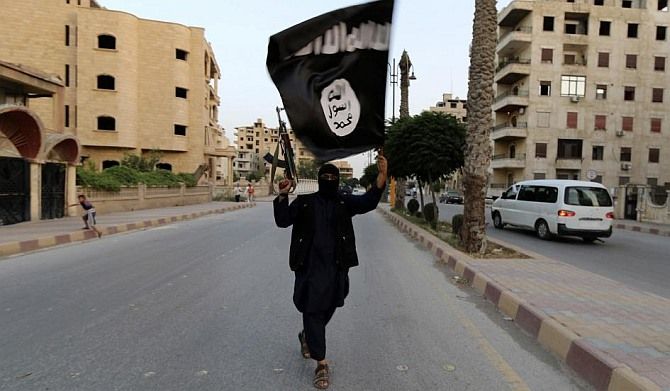"The Islamic State of Iraq and the Levant is as big as it is going to get territorially in Iraq."
"Prime Minister Nouri al-Maliki’s mistakes brought terrorism back to life in Iraq."
"ISIS should not underestimate the power of US targeted strikes."
Michael Knights, a Boston-based Lafer Fellow of The Washington Institute who specialised in the military and security affairs of Iraq, Iran, and the Persian Gulf, spoke to Rediff.com’s Vicky Nanjappa about power of the ISIS and the reasons behind its growth
 Do you think the Iraq government’s decision to push a sectarian agenda is the main reason for the situation the country is in today?
Do you think the Iraq government’s decision to push a sectarian agenda is the main reason for the situation the country is in today?
It is a major contributing factor. It was the mistakes of the Shiite Prime Minister Nouri al-Maliki government -- decommissioning the Awakening (Sunni Sons of Iraq) police paramilitary movement, harassing Sunni Arab politicians, over-centralising power -- that brought terrorism in Iraq back to life.
Can political reforms solve the problem?
Yes, and perhaps such reforms could solve the problem more quickly and easily than people expect. Federalism is the answer -- the sharing of power and resources down to the provincial level, to give Iraq's diverse population the ability to live the way they want to live in each of its regions.
Has US intervention come too late in the day?
The US ensured that elections were held and that they were mostly fair. The US gave Iraq the system of democratic transition that may see Prime Minister Maliki replaced.
And the US built an Iraqi military that is still 70 per cent active and is holding Baghdad and other key points.
The next phase of US intervention could ease political tensions through brokering deals and help targeted counter-terrorism.
The US and Iran appear to have a similar thought process on the fighting in Iraq. Do you see both nations coming together in a bid to solve the Iraq crisis?
No, their relationship remains competitive in Iraq.
Will launching of US air strikes against the ISIS solve the problem?
It will solve part of the problem, which is ISIS' ability to move forces, plan and communicate in complete safety.
ISIS leader (Abu Bakr al-Baghdadi) and his convoys will have to fear the skies again if the US begins strikes. Having seen the US completely decimate Al Qaeda in Iraq in 2006-2007, ISIS should not underestimate the power of US targeted strikes.
The ISIS appears to have overtaken the Al Qaeda? Do you see the ISIS pursuing a more global agenda now?
Not yet, but they are already looking at Turkey, Jordan and Saudi Arabia. They will grow in the region first.
Will more cities like Baghdad fall to the ISIS?
My feeling is no; the ISIS is as big as it is going to get territorially in Iraq.
Where do you think Iraq went wrong in the fight against the ISIS?
The failures of June are complex and the result of a dozen or more key weaknesses. The key reason for failure was the US withdrawal in 2011.
What part do you see countries such as Saudi Arabia playing in this conflict?
Very little! For over 10 years I have searched for evidence of real impact on the ground from Gulf Arab interference. I still haven't seen anything significant.
Did the US misread the situation and pull out too early from Iraq?
Yes, though I believe that the US leaders understood the risks of withdrawal and did not try hard enough. They wanted to withdraw, regardless of the risk.
How does the ongoing conflict affect the rest of the world? Will oil prices sky rocket?
If ISIS attacks Basra, the price will rocket. Otherwise it will stabilise.
What does the conflict do to the economy of Iraq?
The key effect is to make major new investment-driven projects in 4 northern and western provinces impossible for years, such as the Basra-Aqaba pipeline, a new oil export route for Iraq.





